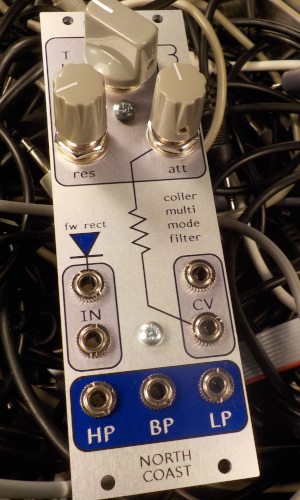Embodying the machine
Sun 28 Aug 2022 by mskala Tags used: psychologyThere's an idea in neuroscience that the brain maintains what is basically a 3D model of the body - the "body schema" - and that when we use tools, they become part of that schema. Claimed evidence for this concept includes studies where people were asked to perform a task with a tool, like picking up an object with a gripper like a pair of tongs, and then measurements afterward suggested their body schema had changed. For instance, the person's response time and the way they moved when picking up an object without a tool might change in a way that suggested their internal estimate of the length of their arms had increased; or their perception of the distance between two touches on their forearm might increase, as if they were at some deep level measuring against an estimated forearm length that had increased.
This idea that tools become part of our imagined body, although widely believed, isn't universally agreed. I've also seen suggestions that the specific research results supporting it can be explained in other ways - for instance, as just the effects of different muscle use changing future movement for the gripper-use speed of subsequent motion thing. There's also an interesting claim about a patient with a specific rare neurological problem that made him unable to perceive his own body, who nonetheless remained able to perceive tools - so that it seemed his disorder which drew a line between body-parts and not-body-parts, was still classifying the tools as not-body-parts.
But the idea that we perceive tools as parts of our bodies is intuitively appealing, and it lines up with claims I've encountered related to certain meditation practices and mind-altering drugs. Meditation is a little like music in being a term applied to many things that are very different from each other; but with at least some of the things people call "meditation," it seems the big exciting result is an enhanced awareness of one's connection to the world around them - a blurring of this line between what is "me" and what is "not me." The body schema expands to include some of the surroundings. Something similar gets reported as an important part of the psychedelic or entheogenic drug experience; there's a reason such drugs are sometimes called "mind-expanding."
I think that when I use a computer, especially for tasks that are familiar and lend themselves to a flow state, it feels like the machine is part of my body. Typing words is a whole lot like speaking. My attention is focused on the cursor, not on my fingers, and I think about the words rather than the action of typing. Sometimes my focus of attention is even further away from me.
I tend to identify more with the hardware than with the software, and with the local software much more than anything out on the Net. Because of this identification, when I sometimes get upset about things that happen while using the computer, the focus of my anger tends to be a more distant target than the local hardware - just like if I touch a hot stove and burn my finger, I might feel anger directed at the stove, but not at my finger. It's part of me.
Because any computer I use feels kind of like part of my body, I'm sensitive to anything that feels like an external intrusion into it. I think this is one reason I object so strongly to "digital rights management," "trusted computing," forced software "updates" especially if they come with feature removals and UI breakage, and even just plain Javascript. These are things that attempt to make my body not my own.
0 comments
